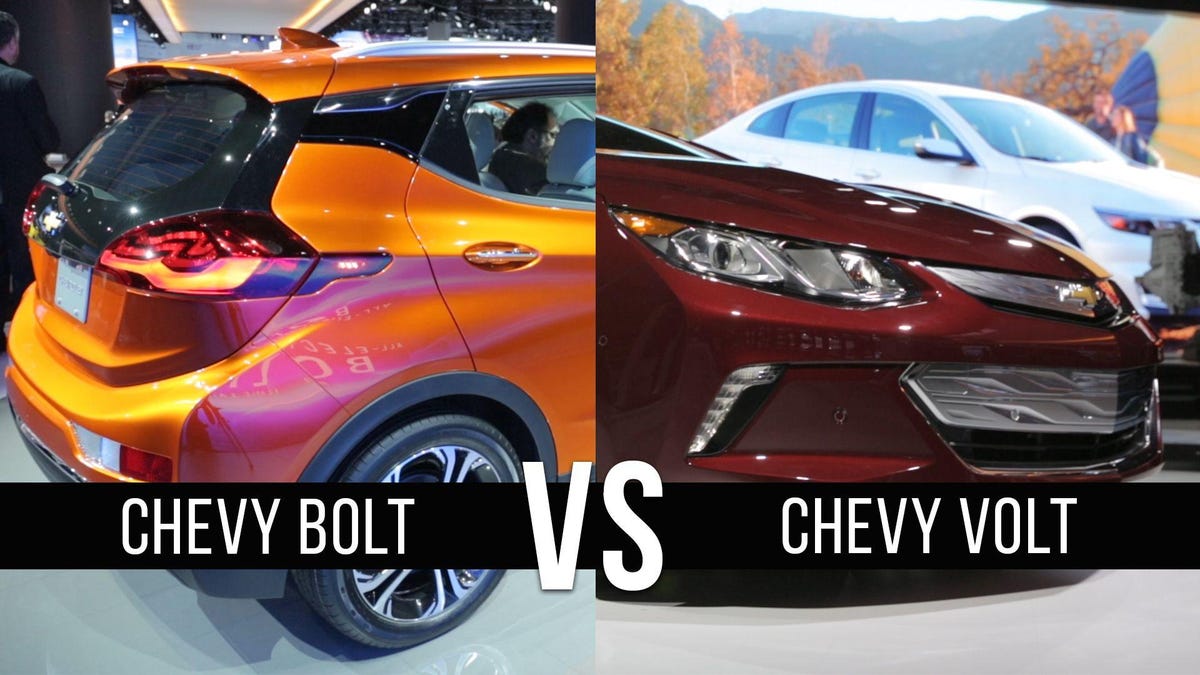What's the financial break-even point for the Chevrolet Bolt and Volt?
With today's energy costs, recouping the initial price premium the Chevy Bolt EV carries over its hybrid Volt brethren will take quite a bit of time.

Here at Roadshow , we're big fans of the Chevrolet Bolt -- so much that we honored it with a Roadshow Shift Award back in January at the Detroit Auto Show. Not only is it filled with lots of cabin tech, it's quite entertaining to wheel around and features a driving range of up to 238 miles, helping calm range anxiety worries.
But is the Bolt the best green vehicle in a Chevy portfolio that also includes the second-generation Volt hybrid? The answer to that question depends on a number of variables, but there's no denying that the Volt also possesses strong green credentials with 53 miles of all-electric driving range. When factoring in the gas engine, a total range of up to 420 miles is possible, according to the EPA.
Setting aside environmental factors, when it comes down purely to the dollars and cents, does the Volt or the Bolt make better financial sense?
Making up the difference
The technical advances in the Bolt are extraordinary, and the fact that Chevy is offering it at a base price of $37,495, which includes destination charges, seems reasonable. However, that's still at a $3,400 premium over the Volt's $34,095 MSRP. Since both cars qualify for the $7,500 federal tax credit, buying Chevy's full electric vehicle over the hybrid will still cost you $3,400 more in most states, but final transaction prices can vary wildly with dealer discounts or mark ups depending on location.
How long will it take you to recoup the additional investment in the Bolt? For the sake of simplicity, we will forgo taking into account maintenance costs, where the Bolt holds an upper hand over the Volt, as those will differ from dealer to dealer. Instead, we'll focus on cost per mile deduced from EPA estimated figures.
Based on the EPA's combined estimates, which factor in 45 percent highway and 55 percent city driving, the Volt costs 4.3 cents per mile to operate with today's average $2.42 per gallon price of gas and 13 cents per kilowatt hour of electricity. In the Bolt's case, 3.7 cents of electricity is required to travel one mile, meaning the full electric car saves you 0.6 cent per mile over the Volt.
Breaking even in the Bolt with take some time.
Taking that into account, the Bolt and Volt need to cover 566,667 miles before the $3,400 price premium is recouped with today's energy prices. To put it another way, for folks who drive an average of 15,000 miles per year, the break-even point will take nearly 38 years to occur. After that, the energy cost savings is all gravy!
Chevy Bolt a stronger case in California
In states that offer tax incentives on electric and hybrid vehicles, the Bolt's financial case can get a little more appealing. For example, in New York the Volt receives a $1,700 tax credit, while the Bolt gets a slightly more generous $2,000 incentive to bring the beginning cost difference to $3,100.
California helps the Bolt makes its strongest case against its gas/electric sibling with the EV getting a $2,500 incentive, while the hybrid only receives $1,500 to drop the initial price gulf to $2,400. Breaking even in the Golden State will take 400,000 miles, or about 27 years for those who drive 15,000 miles per year.
The Bolt pays you back eventually
While the Bolt will make financial sense over the Volt in the very long haul, the Chevy EV's greatest argument is that it will entirely eliminate visits to gas pumps, and provide owners some peace of mind that they aren't contributing CO2 tailpipe emissions to the environment. To some, that is all that's needed to justify the additional cost of entry for the Bolt compared with the Volt.
For those most concerned about the impact on your wallet, the Volt is a more realistic money saver.

